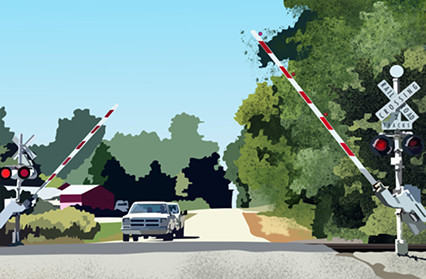‘The Unexpected’ (1895) by Kate Chopin
Hayley Long
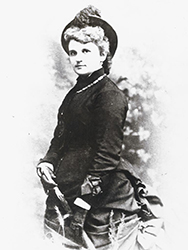 With a total of fewer than 1300 words, ‘The Unexpected’ is a very short story. And yet within that tight and claustrophobic word count, Kate Chopin takes her readers’ emotions and pulls them in all directions. This tale of young love and betrothal within the wealthy society of Cajun Louisiana begins like just another southern romance. Dorothea is the beautiful, privileged, unworldly belle; Randall is her perfect lover. But even before the first sentence has ended, Chopin has laid the foundations for disaster.
With a total of fewer than 1300 words, ‘The Unexpected’ is a very short story. And yet within that tight and claustrophobic word count, Kate Chopin takes her readers’ emotions and pulls them in all directions. This tale of young love and betrothal within the wealthy society of Cajun Louisiana begins like just another southern romance. Dorothea is the beautiful, privileged, unworldly belle; Randall is her perfect lover. But even before the first sentence has ended, Chopin has laid the foundations for disaster.
But it is not so much the plot of this tiny masterpiece that I find interesting; it is more how Kate Chopin absolutely manipulates the feelings of her readers. By the end of page one, I found myself shaking my head in disapproval at Dorothea’s lack of sincerity. I was confident of my moral superiority; I knew what I thought of Dorothea and I knew I was correct to think that. But by the end of only page two, I suddenly realised I was on her side. Bottom of page three and I was applauding her. A paragraph or so after that, the story is over and I have elevated Dorothea to the status of an early champion for the women’s liberation movement. But there is an uncomfortable confusion in my mind too. Because I am still not entirely sure that Dorothea is not just a selfish, spoiled little rich girl of the highest order.
And that is what makes this story so extraordinary. Chopin understands the two-way process of literature and plays with her readers. We are puppets and she pulls our strings. As the tale of Dorothea and Randall’s doomed engagement unfolds, so too do we. Chopin finds us out. If we are, by nature, inflexible and lacking compassion, she will uncover it. If we are shallow, easily swayed and quick to abandon anyone within her fictional world, she will show this too. She forces us to examine our reactions to Dorothea’s predicament. Do we condemn her or do we align ourselves with her. Ultimately, it does not matter. Because whichever way we turn, it is impossible not to turn away from ‘The Unexpected’ feeling some sort of guilt.
Vernon God Little (2003) by DBC Pierre
Tom Anderson
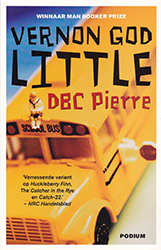 Super bad taste, but ruthlessly heart-warming. A book full of direst profanity that my Christian friend’s even more Christian parents still read and loved. Quite how DBC Pierre managed to create something so versatile is one of Southern Lit’s big questions – more important than ‘was Brick gay’ or ‘where was Huck going’. For me, you mention the Deep South, a part of the world I visited years ago and fell immediately in love with, and the first book character that comes to mind is Vernon. Vernon Gullible Little, Vernon Gregory Little… Vernon GOD Little: my choice for a Southern Lit recommendation, and I say it proud and unashamed.
Super bad taste, but ruthlessly heart-warming. A book full of direst profanity that my Christian friend’s even more Christian parents still read and loved. Quite how DBC Pierre managed to create something so versatile is one of Southern Lit’s big questions – more important than ‘was Brick gay’ or ‘where was Huck going’. For me, you mention the Deep South, a part of the world I visited years ago and fell immediately in love with, and the first book character that comes to mind is Vernon. Vernon Gullible Little, Vernon Gregory Little… Vernon GOD Little: my choice for a Southern Lit recommendation, and I say it proud and unashamed.
This is truly a gorgeous work of writing. From the start (the first line makes it explicit), that Southern heat is oppressive and inspiring. We can taste the vile food of the Bar B Chew Barn and, though Vernon is able to describe it with even more vulgarity than he is sex and masturbation, we would still order a set of wings from there right away, were it a real place.
But none of it is real, and that is the true genius of the book. The South, Dixieland, Texas, the Mexican borders, the smells, the weather, the kind neighbours, leering womanisers, lazy trailer trash, conservative police officers, merciless gossipers, doddery elderly people and pretty young girls – that entire spread of baking land is all about a sense of place. And yet DBC Pierre fictionalises the lot – taking us to the made-up town of Martirio (‘martyrdom’ in Spanish) where made-up Vern has carried out an also possibly made-up high-school shooting in circumstances that are chillingly real, both to the 2003 America into which the novel was sent and to the present nation which has done little to assuage its fears of child violence.
Yes, that is who we ride with. A present tense, lyrically colloquial, teenage narrator who can’t even work out if he is a mass murderer. A young boy lost in a world that is out to get him – hiding in the bushes from a loveless mother while stalking the intoxicating, fabric smell of the freshest pairs of ‘panties’ he can find.
Vernon deserves his surreal ending, and so do we. I know I have already laboured the things I adore about this novel – but that really is the cherry on the cake (or paprika on the drumstick). From the sticky uber-reality of Martirio, this novel takes a From Dusk till Dawn-style turn into farce (and the bad reviews only helped it work better). Does Vern really land the school beauty several years his junior? Does he really get away? Does he really get hauled back in? Does he really end up on… Better leave it there in case it kills the surprise. (It won’t – conventional is the last thing this novel’s ending can be slapped with.)
Oh, and there is my favourite line too – possibly ever! Who thinks of this? Pages after little Vern has described the oil derrick besides his house as a ‘praying mantis’ (a simple enough visual image, of course), the metaphor returns with a squirt: without warning, just when we have almost forgotten, between the Texan humidity and teenage gloom our (maybe) murderous idol muses these wonders:
Fuck, fuck, fuck goes the mantis, like it does every four seconds of my life. Gas, brake, gas, brake, Pam berths the car like a ferryboat. Fuck, fuck, gas, brake, I’m snagged in the apparatus of Martirio.
So are we. Forever. Vernon God Little, I salute your achievements.
To Kill a Mockingbird (1960) by Harper Lee
Elin Williams
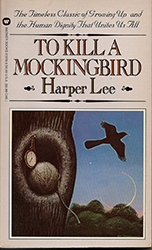 A friend of mine lived in an attic room in Cardiff for a year. He used to have his Amazon deliveries addressed to ‘Boo Radley Palmer’ in recognition of his seemingly weird dwelling space.
A friend of mine lived in an attic room in Cardiff for a year. He used to have his Amazon deliveries addressed to ‘Boo Radley Palmer’ in recognition of his seemingly weird dwelling space.
Despite its status as one of the most successful pieces of American literature, it is unlikely that young people who have left the education system in the last ten years or so will have read it. It is notoriously a great on the GCSE ‘spec’ (one of the many original abbreviations I have found myself using during this past year on the PGCE course), but most schools opt for Steinbeck’s tale of two travelling ranch workers. The reason for this is simple: kids do better in the exam. Teachers speak fondly of ‘that year I did To Kill a Mockingbird with a high flying set one’, and subsequently speak ominously of ‘that year where that teacher did To Kill a Mockingbird with a not so high flying set’.
My sister, who usually opts for books about a girl with a terminal illness (which I argue is better than not reading… just) still fondly remembers Jem and Scout. It is certainly a book that you remember studying, but a book that most people are unlikely to pick up outside a classroom. I remember reading that same copy which accompanied my sister into an exam, vandalised by notes on mood and atmosphere, because I thought it was probably wise being a graduate of literature and never having read it. Mainly because it comes up on The Chase quite often, and people generally look to me when a question like that comes up. That and a Shakespeare question. I’ll be honest, it is usually a lucky guess.
Following the Gove hysteria where everybody thought he was axing both Steinbeck’s and Lee’s cultural classics (which he wasn’t, by the way) teachers (including myself, who have done a great deal of resource hoarding this year) could not believe that they may have to start from scratch. For many, it was less about the status of these books and how they contributed to children’s cultural awareness, and more about sending guinea pigs into a newly formatted exam. Following this, I started to really think about the pros and cons of having such a paragon of Southern Literature on the syllabus. Without the exam, fewer people would know the story of the children and the recluse in nineteen thirties Alabama. With the exam, do not they just learn the prescriptive themes of character and plot? Do they grow to hate it because it is associated with a single desk in a gymnasium with a box of confiscated mobile phones? Or do most of them remember it as fondly as I do, reading it on a sun lounger on a sunny week in August?
The purpose of putting such books on a syllabus is straightforward; It is meant to teach children about the cultural diversity of the world, introducing them to contexts that they are unlikely to ever come face to face with. But does it actually do that? By putting these novels on a GCSE ‘spec’, are we devaluing them as exemplary pieces of literature?
I suppose it is a double-edged sword. But one thing remains certain: Harper Lee’s moralistic tale will remain a classic of Southern Literature, regardless of what Michael Gove decides to do with it.
The Son (2013) by Philipp Meyer
Michael Lydon
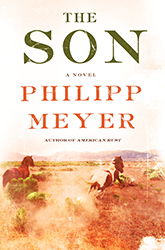 Frederick Jackson Turner, in his seminal paper of 1893 ‘The Significance of the Frontier in American History’, remarked that, ‘the wilderness masters the colonist. It finds him a European in dress, industries, tools, modes of travel, and thought. It takes him from the railroad car and puts him in the birch canoe. It strips off the garments of civilisation and arrays him in the hunting shirt and the moccasin.’ Turner’s thesis was that this wilderness, this frontier, shaped the colonist, removing old-world influence and ideals, and created that person anew with ‘a steady growth of independence on American lines’. In Turner’s view, this frontier thesis shaped many defining tropes of American identity ranging from ideas of American ‘exceptionalism’, based on conquest of nature and expansion, but also ruthlessness, which was formed through savage wars with native frontier occupancy and cultivation of land through slavery. In essence, this duality of exceptionalism/ruthlessness was constructed by the frontier, and, to an extent, defines Americanism; albeit ignoring historically marginalised groupings.
Frederick Jackson Turner, in his seminal paper of 1893 ‘The Significance of the Frontier in American History’, remarked that, ‘the wilderness masters the colonist. It finds him a European in dress, industries, tools, modes of travel, and thought. It takes him from the railroad car and puts him in the birch canoe. It strips off the garments of civilisation and arrays him in the hunting shirt and the moccasin.’ Turner’s thesis was that this wilderness, this frontier, shaped the colonist, removing old-world influence and ideals, and created that person anew with ‘a steady growth of independence on American lines’. In Turner’s view, this frontier thesis shaped many defining tropes of American identity ranging from ideas of American ‘exceptionalism’, based on conquest of nature and expansion, but also ruthlessness, which was formed through savage wars with native frontier occupancy and cultivation of land through slavery. In essence, this duality of exceptionalism/ruthlessness was constructed by the frontier, and, to an extent, defines Americanism; albeit ignoring historically marginalised groupings.
In many ways, this same frontier thesis is explored in Philip Meyer’s epic novel of 2013, The Son, which tells the tale of a fictional Texan family, the McCulloughs. In echoing Turner’s frontier thesis, the novel’s central theme is, ‘Follow your footprints long enough and they will turn into those of a beast’. The Son begins in 1849, with thirteen year-old Eli McCullough being taken as a slave by Comanche Indians. During his servitude, which is enforced brutally, young Eli adapts to become a member of the tribe. He is, thus, constructed by the savagery of his frontier life, which he brings into later life as he becomes the patriarch of a successful Southern oil dynasty; as Eli, or The Coronal as he is later known, remarks, ‘It had become clear to me that the lives of the rich and famous were not so different from the lives of the Comanches: you did what you pleased and answered to no one.’ In conjoining narratives, The Son, also tracks the life of Eli’s son Peter, and great-granddaughter Jeanne, who, in their own way, react to the ever modernising South, but also their inherited frontier past. Moreover, towards the end of this epic tale of a Texan dynasty, a new narrative is included which addresses the engagement with frontier inheritance full on, as the past becomes beautifully personified by retreating rider and a white horse.
In essence, Meyer’s The Son, brings to life a Texan family emblematic of the American struggle with its inherited frontier past. In Eli McCullough, Meyer shows the transformation from European civility, to frontier formed American exceptionalism/ruthlessness. The Son, is an epic in form, and in subject matter, and a novel that reveals Meyer as more than promising figure in contemporary American fiction.
Hill William (2013) by Scott McClanahan
Bethan Tachwedd
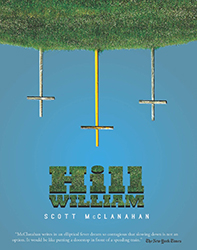 I first came across Scott McClanahan via Dzanc Books’ 2010 ’20 Writers Worth Watching’ feature. I managed to source a copy of Stories II (2009) and was intrigued and blown away in equal measure. I could not understand how this vibrant, raw, and well-crafted work was existing in relative obscurity. Whilst the prose probably lacked the rather obvious (and some might say tedious) ‘polish’ of the mainstream literary big hitters, it felt ethereal and real. I continued reading McClanahan’s work, often scouring the internet for short stories and articles. It was at this point that I arrived at Hill William.
I first came across Scott McClanahan via Dzanc Books’ 2010 ’20 Writers Worth Watching’ feature. I managed to source a copy of Stories II (2009) and was intrigued and blown away in equal measure. I could not understand how this vibrant, raw, and well-crafted work was existing in relative obscurity. Whilst the prose probably lacked the rather obvious (and some might say tedious) ‘polish’ of the mainstream literary big hitters, it felt ethereal and real. I continued reading McClanahan’s work, often scouring the internet for short stories and articles. It was at this point that I arrived at Hill William.
The LA Review of Books article on Hill William describes McClanahan as ‘writing off the beaten path of mainstream fiction’, a description that certainly fits but also possibly, and unintentionally, does a disservice to how accessible his work is. I read Hill William in one sitting; fittingly lying on a hammock and sinking Corona on a hot Thursday afternoon, I became immersed in his world – and what a world. Set in the most rural of rural Western Virginia, the reader is treated to a series of characters that a lazy interpretation could dismiss as stereotypes. This would be a catastrophic misreading. What McClanahan does is present the reality of life if you are impoverished and poor in the US South, and humanise it in an uncompromising and non-patronising way. The book’s protagonist is called Scott, brilliantly only mentioned by name once in the entire novel; clearly there is a large degree, as there appears to be in his other work, of autobiography – and this adds to the raw, often brutal tale of a young man struggling to deal with his anger, his disconnection from his family, friends, and the landscape he grew up in and ultimately left behind.
That being said, do not confuse this for misery lit. It is extremely funny, and you only need to watch McClanahan’s book trailer for Hill William to see that this is someone dealing with his past, present and future in the most creative and honest way he knows how. Look it up on YouTube. Watch it before you read the novel, then watch it in the immediate moments after you have finished. It is moving and funny and shocking, just like the story itself.
Hill William begins as a flashback to Scott’s childhood and works its way back to the present day. The pace is manic, the short chapters take the reader along, almost dreamlike, towards what I would describe as a finale comparable to Steinbeck’s The Grapes Of Wrath. Hill William is a once read, never forgotten novel – and writing this has just prompted me to pick it up again for what will be a fourth time.
The Long March (1953) by William Styron
Adam Somerset
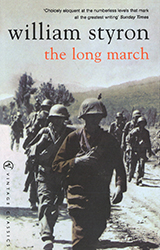 William Styron was aged twenty-eight when his novella The Long March was published. Like much first writing its source is autobiographical, an episode from Styron’s military service before an eye condition prompted his discharge. It is a sixty-page novella but looks forward to the award-winning novels of weight of fifteen years on. Its source is an act of violence, its subject men under extremity of duress.
William Styron was aged twenty-eight when his novella The Long March was published. Like much first writing its source is autobiographical, an episode from Styron’s military service before an eye condition prompted his discharge. It is a sixty-page novella but looks forward to the award-winning novels of weight of fifteen years on. Its source is an act of violence, its subject men under extremity of duress.
The setting is North Carolina. The South has been transformed over two generations; civil rights the political turning point, air conditioning the galvanising technology for economic change. The region may like to promote itself in 2014 as Georgia Tech, the booming Memphis skyline or boasting the world’s most advanced robotic car plants. But it has a flora and fauna utterly alien to the visitor, not least to the European. Styron’s opening sentence places his soldier characters ‘among the poison ivy and pine needles and the loblolly saplings.’ His protagonist raises an eye from his office work to look out across ‘smoky hot barrens of pine and sand.’ Outside the army camp ‘back off in the bushes a mockingbird commenced a shrill rippling chant.’ On the gruelling march of the novella’s title ‘frogs piped shrilly in the night, among the cypress and the shallows.’ The noise in the swamp rises to ‘a brainless chorale’ in a dusk where ‘the swarms of gnats rose and fell in vivacious, panicky flight.’
In the world of humans a character spits out a gob of tobacco-juice onto the sand. Styron notes its colour as auburn. Another has a ‘pensive bulge of tongue sliding inside one tanned cheek.’ An exhausted soldier sleeps ‘filling the air around him with a loud, tranquil blubber.’ The last word may not be dictionary-predictable but is in the meaning of to render the face wet and swollen.
The psychology in The Long March is that of a forming writer, neither dense nor ambiguous. Formally The Long March incorporates flashback and the language is ever new. Some humdrum clerical duties render its doer ‘ensnared futilely in the coils of some administrative fly paper.’
And Styron obeys a first law in crafting a narrative – make yourself a good opening. ‘One noon, in the blaze of a cloudless Carolina summer, what was left of eight dead boys lay strewn about the landscape’ runs his first part-sentence. Maybe the grammar is not of the greatest but it grips. ‘It was not so much as if they had really died quickly but as if, sprayed from a hose, they were only shreds of bone, gut and dangling tissue to which it would have been impossible ever to impute the quality of life, far less the capacity to relinquish it.’ The writer switches to the perspective of his character-observer. Read on.
The works of Peter Taylor
Nigel Jarrett
Of all seductive 20th-century American writers, Peter Hillsman Taylor is the most likely to raise the hackles of the politically-correct. His stories of the Deep South are notable for their absence of blacks except in the marginal roles of skivvies and retainers. It is not part of Taylor’s beguiling, conversational manner to conceal this fact from the reader but the ‘negroes’ (as he calls them) are never representative of a wider caucus and appear, if at all, almost as curious interlopers in a world where the whites are preoccupied with nostalgia, custom and eccentricity among their own kind. In any case, when they do appear, it is not as stereotypes or objects of derision.
Many of Taylor’s stories begin with the recollection of a custom that the narrator, estranged from its source, looks back on with more affection than superiority. Sometimes, as in The Captain’s Son, it’s a characteristic unlikely to fade (in this case the fleeing blackguards who quirkily link one Tennessee city with another). Almost straightaway, Taylor’s compelling narrative has the ring of authority, and he repeatedly explores the consequences of the annoyingly peculiar. In the Miro District, for example, is a story about a young man’s irritation at his parents for foisting his crotchety grandfather on him during adolescence, and disposing of both in a single stroke.
Born in Tennessee in 1917, Taylor lived for years in Virginia, until his death in 1994. He produced eight story collections and three novels. A Summons to Memphis, his late masterpiece, is an account by an enlightened New Yorker of how he is drawn into the machinations of his sisters down South to prevent their widower father from becoming prey to matrimony. He is particularly strong on rites of passage, notably in his most famous story, Venus, Cupid, Folly and Time, which examines, among other things, the suspicion of an incestuous relationship, but more significantly records and measures the detonation when the worlds of adults and children collide.
Taylor is often praised for writing in ‘the great Southern tradition’, meaning, one supposes, the chronicling of white family life in times of change. His best achievement in this genre is In the Tennessee Country, a novel of 1994 worked up from a story called Cousin Aubrey, which tells of a man of irregular kinship but legendary exploit who is contrasted with the narrator and his unfulfilled ambitions.
It might be argued that Taylor’s love of strange characters, those against whom ordinary lives are evaluated or in whose shadow others are changed, might have directed his attention to the life of the ‘negroes’. But it is in his general lack of attention to them that, paradoxically, his integrity lies. When they do appear downstage, as the devoted but volatile Jesse does in A Friend and Protector, they are as intriguing (and as interesting) as all the other white oddities in Taylor’s fictions. They are certainly not Uncle Toms, at least not in the often unusual positions they have negotiated for themselves in the realms of servitude. One writes about what one knows. Well, Peter Taylor did.
original illustration by Dean Lewis


